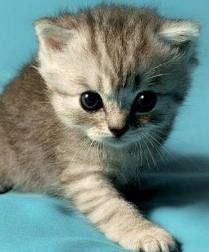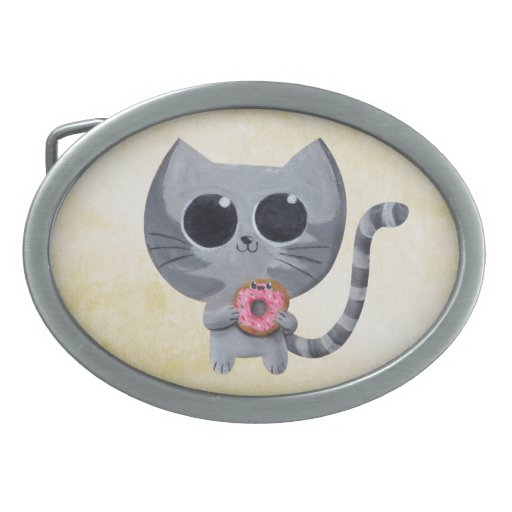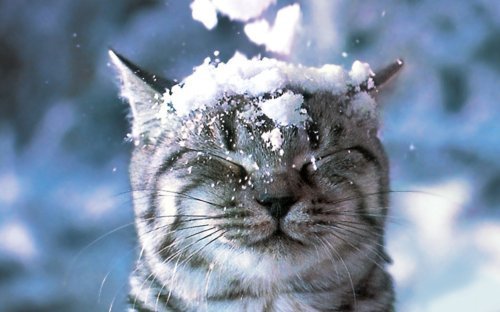Source(google.com.pk)
Cute Kitty Pictures Biography
Vegan or vegetarian diets for cats are controversial. According to the United States National Research Council, "Cats require specific nutrients, not specific feedstuffs."[10] The International Vegetarian Union,[14] the Vegan Society[15] and PETA[16][17] are some of the organizations that support a vegan or vegetarian diet for cats. The Animal Protection Institute does not recommend a vegetarian diet for cats,[18] and neither does the American Society for the Prevention of Cruelty to Animals (ASPCA).[19]
Not all animal advocacy groups take a firm position either way. The Association of Veterinarians for Animal Rights (now Humane Society Veterinary Medical Association) accepts that it is possible for a plant-based diet to be nutritionally adequate but stated in August 2006 that such diets "cannot at this time be reliably assured".[20] This position was based on a 2004 study demonstrating that two commercially available vegetarian cat diets contained nutritional deficiencies.[21] However, broad conclusions cannot be drawn from this study, because (i) it examined only two of many available diets, (ii) for one of these diets, the formulation error responsible was promptly identified and corrected,[22] and (iii) this study is increasingly dated. Nevertheless, it remains likely that formulation errors will result in nutritional deficiencies in a wide range of commercially available diets from time to time, whether meat-based, vegetarian or vegan. Hence, regular (at least, annual) veterinary checkups of all companion animals is recommended, and brands may be occasionally varied.[22]
In 2006 the first study of the health of a population of long-term vegetarian cats (mostly vegan) was published in the Journal of the American Veterinary Medical Association. Most cats were clinically healthy, barring minor blood value changes in three cats who were fed partly on table scraps.[23]
[edit]Homemade food
Further information: Raw feeding
Many pet owners feed cats homemade diets. These diets generally consist of some form of cooked or raw meat, bone, vegetables, and supplements, such as taurine and multivitamins.[citation needed]
[edit]Bisphenol A
A 2004 study reported that food packaged in cans coated with bisphenol A is correlated with the development of hyperthyroidism in cats.[24]
[edit]Food allergy
Food allergy is a non-seasonal disease with skin and/or gastrointestinal disorders. The main complaint is excessive scratching (Pruritus) which is usually resistant to treatment by steroidal anti-inflammatory drugs. The exact prevalence of food allergy in cats remains unknown. In 20 to 30% of the cases, cats have concurrent allergic diseases (atopy / flea-allergic dermatitis). A reliable diagnosis can only be made with dietary elimination-challenge trials. Allergy testing is necessary for the identification of the causative food component(s). Therapy consists of avoiding the offending food component(s).[25]
[edit]Malnutrition
Malnutrition can be a problem for cats fed non-conventional diets. Cats fed exclusively on raw, freshwater fish can develop a thiamine deficiency. Those fed exclusively on liver may develop vitamin A toxicity. Also, exclusively meat-based diets may contain excessive protein and phosphorus whilst being deficient in calcium, vitamin E, and microminerals such as copper, zinc, and potassium. Energy density must also be maintained relative to the other nutrients. When vegetable oil is used to maintain the energy balance cats may not find the food as palatable.[26]
[edit]Recalls
Main article: 2007 pet food recalls
The broad pet food recalls starting in March 2007 came in response to reports of renal failure in pets consuming mostly wet pet foods made with wheat gluten from a single Chinese company beginning in February 2007. Overall, several major companies recalled more than 100 brands of pet foods with most of the recalled product coming from Menu Foods. The most likely cause according to the FDA is the presence of melamine in the wheat gluten of the affected foods. Melamine is known to falsely inflate the protein content rating of substances in laboratory tests. The economic impact on the pet food market has been extensive, with Menu Foods alone losing roughly $30 Million from the recall.










Cute Kitty Pictures Biography
Vegan or vegetarian diets for cats are controversial. According to the United States National Research Council, "Cats require specific nutrients, not specific feedstuffs."[10] The International Vegetarian Union,[14] the Vegan Society[15] and PETA[16][17] are some of the organizations that support a vegan or vegetarian diet for cats. The Animal Protection Institute does not recommend a vegetarian diet for cats,[18] and neither does the American Society for the Prevention of Cruelty to Animals (ASPCA).[19]
Not all animal advocacy groups take a firm position either way. The Association of Veterinarians for Animal Rights (now Humane Society Veterinary Medical Association) accepts that it is possible for a plant-based diet to be nutritionally adequate but stated in August 2006 that such diets "cannot at this time be reliably assured".[20] This position was based on a 2004 study demonstrating that two commercially available vegetarian cat diets contained nutritional deficiencies.[21] However, broad conclusions cannot be drawn from this study, because (i) it examined only two of many available diets, (ii) for one of these diets, the formulation error responsible was promptly identified and corrected,[22] and (iii) this study is increasingly dated. Nevertheless, it remains likely that formulation errors will result in nutritional deficiencies in a wide range of commercially available diets from time to time, whether meat-based, vegetarian or vegan. Hence, regular (at least, annual) veterinary checkups of all companion animals is recommended, and brands may be occasionally varied.[22]
In 2006 the first study of the health of a population of long-term vegetarian cats (mostly vegan) was published in the Journal of the American Veterinary Medical Association. Most cats were clinically healthy, barring minor blood value changes in three cats who were fed partly on table scraps.[23]
[edit]Homemade food
Further information: Raw feeding
Many pet owners feed cats homemade diets. These diets generally consist of some form of cooked or raw meat, bone, vegetables, and supplements, such as taurine and multivitamins.[citation needed]
[edit]Bisphenol A
A 2004 study reported that food packaged in cans coated with bisphenol A is correlated with the development of hyperthyroidism in cats.[24]
[edit]Food allergy
Food allergy is a non-seasonal disease with skin and/or gastrointestinal disorders. The main complaint is excessive scratching (Pruritus) which is usually resistant to treatment by steroidal anti-inflammatory drugs. The exact prevalence of food allergy in cats remains unknown. In 20 to 30% of the cases, cats have concurrent allergic diseases (atopy / flea-allergic dermatitis). A reliable diagnosis can only be made with dietary elimination-challenge trials. Allergy testing is necessary for the identification of the causative food component(s). Therapy consists of avoiding the offending food component(s).[25]
[edit]Malnutrition
Malnutrition can be a problem for cats fed non-conventional diets. Cats fed exclusively on raw, freshwater fish can develop a thiamine deficiency. Those fed exclusively on liver may develop vitamin A toxicity. Also, exclusively meat-based diets may contain excessive protein and phosphorus whilst being deficient in calcium, vitamin E, and microminerals such as copper, zinc, and potassium. Energy density must also be maintained relative to the other nutrients. When vegetable oil is used to maintain the energy balance cats may not find the food as palatable.[26]
[edit]Recalls
Main article: 2007 pet food recalls
The broad pet food recalls starting in March 2007 came in response to reports of renal failure in pets consuming mostly wet pet foods made with wheat gluten from a single Chinese company beginning in February 2007. Overall, several major companies recalled more than 100 brands of pet foods with most of the recalled product coming from Menu Foods. The most likely cause according to the FDA is the presence of melamine in the wheat gluten of the affected foods. Melamine is known to falsely inflate the protein content rating of substances in laboratory tests. The economic impact on the pet food market has been extensive, with Menu Foods alone losing roughly $30 Million from the recall.
Cute Kitty Pictures Biography

Cute Kitty Pictures Biography

Cute Kitty Pictures Biography

Cute Kitty Pictures Biography

Cute Kitty Pictures Biography

Cute Kitty Pictures Biography

Cute Kitty Pictures Biography

Cute Kitty Pictures Biography

Cute Kitty Pictures Biography

Cute Kitty Pictures Biography

Cute Kitty Pictures Biography
No comments:
Post a Comment